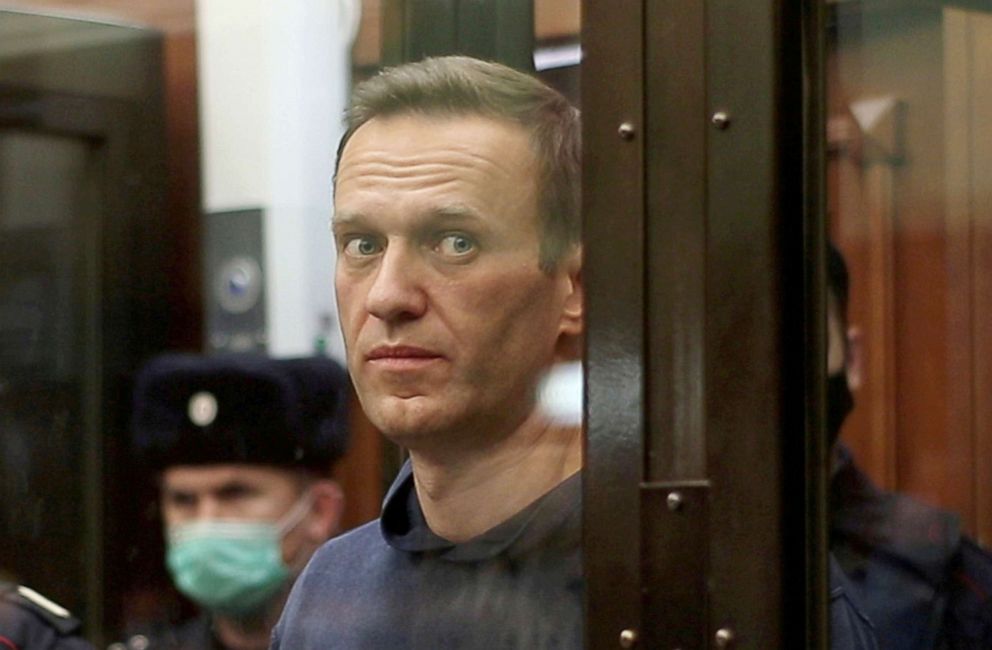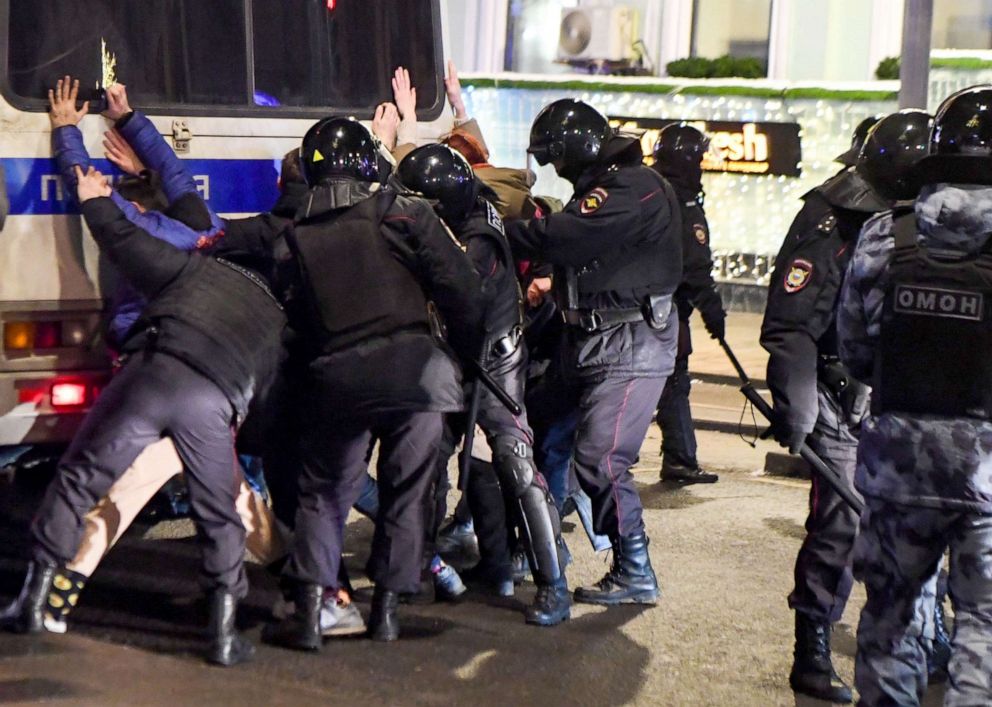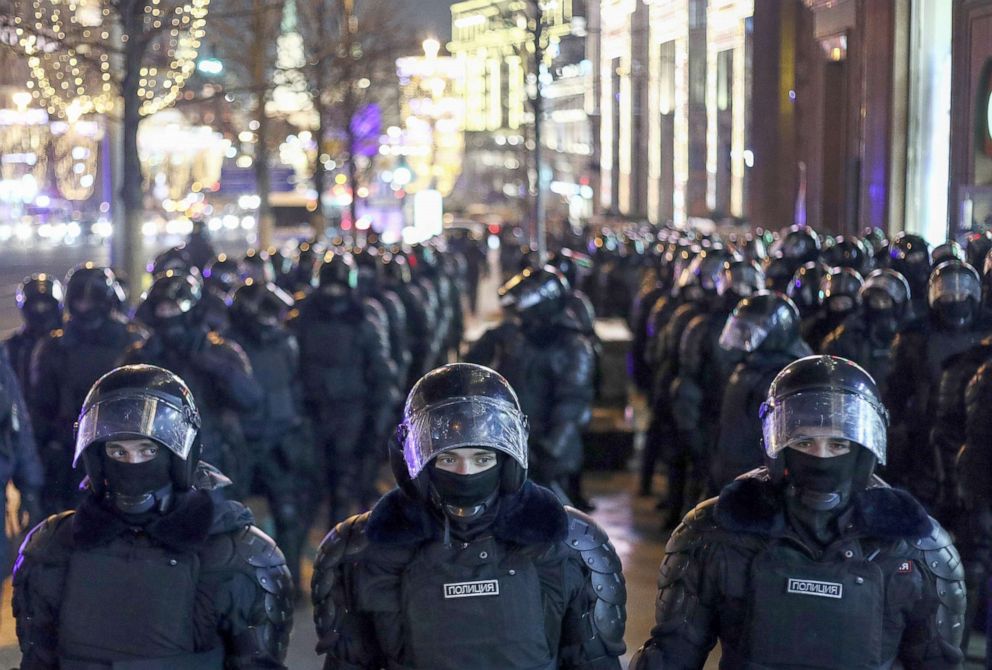How Putin keeps his grip over Russia, even with support waning
How much of a challenge does Alexey Navalny pose to the Russian leader?
When the Russian opposition politician Alexey Navalny returned to Russia in January, he threw down a gauntlet to president Vladimir Putin’s authority.
It was challenge watched by the world as Navalny—having survived a nerve agent poisoning months earlier—flew into Moscow.
The Kremlin’s response has been blunt. Navalny was swiftly sentenced to over 2 1/2 years in prison in a trial condemned internationally as being politically motivated. The unusually large protests in Russia that followed Navalny’s imprisonment were swiftly and robustly suppressed, as authorities deployed police on an unprecedented scale. Thousands were detained and hundreds then fined or given short prison sentences. Police targeted Navalny’s allies with a barrage of raids and new criminal prosecutions, putting most of them in detention.
After two weekends of protests, which saw so many detained that Moscow’s jails and courts briefly backed-up, Navalny’s team called off any further streets protests until the summer.

Two months since Navalny’s return, the Kremlin has successfully choked off the protests and reasserted its control. Navalny himself is in now out of sight in a prison 60 miles east of Moscow. As the dust settles, the scale of the challenge Navalny himself is clear, but the recent weeks also contain longer-term signs that will not please the Kremlin.
That outcome has affirmed Putin’s capacity to retain control, but it also points to an unappealing future for the Kremlin, one where it has to rely more and more on crude authoritarianism.
For the past two decades Putin’s Kremlin has tried to maintain its power without resorting to naked repression, able to rely on growing prosperity and by ensuring its control over Russia’s media and political institutions. But with polls showing support for Putin weakening among Russians and no obvious way to revive a stagnating economy, it’s clear that period is over.
“I think both sides are probably disappointed with the outcome,” said Sam Greene, professor of politics at Kings College London. “There is more opposition than the Kremlin wants to see and less opposition than Navalny and his team want to see.”
In many ways the protests reaffirmed the strength of Putin’s control. Although unusually large for Russia, involving tens of thousands of people, they were still not huge. On the day Navalny was sentenced, only a couple of thousand people came out to protest. The authorities are having to impose unprecedented pressure on demonstrators, but it is having effect.
“What we're not seeing, right, is enough people coming out to actually change the nature of politics in Russia. There's nothing that is sending a signal to the Kremlin or to the elite that they can't control the streets,” said Greene.
Independent polls have shown that despite the drama, there has been little impact on Russians’ attitudes towards Navalny and Putin. According to the independent pollster the Levada Center, around 19% of Russians approve of Navalny’s actions, while 56% disapprove.
That is 6% more who disapprove than before Navalny returned. The same Levada polls show trust for Navalny among Russians overall has crept up slightly, from 3 to 4%.

The polling suggests that the government has succeeded in controlling the narrative around Navalny, the center’s deputy director, Denis Volkov said.
State media have portrayed the protests as violent riots attended mostly by adolescents. Immediately after his jailing, authorities also put Navalny on trial for allegedly slandering an elderly World War II veteran. The sometimes bizarre trial, criticized by rights groups politically-motivated, allowed state television to paint Navalny as unpatriotic.
Much of Navalny’s success has been in using social media to get around the Kremlin’s control of the media. The best example is his recent film unveiling a lavish palace allegedly built secretly by Putin on the Black Sea. The film has now been watched on YouTube more than 100 million times. But Levada Center polling showed the film did not change most people’s views towards Putin, instead reinforcing those already held.
The majority of Russians remain apathetic and deeply cynical about political change, attitudes also cultivated by Kremlin propaganda, experts said, which poses a huge challenge to Navalny’s efforts to mobilize them.
“Navalny paid an unbelievably high price to boost his trust rating by just 1 percent,” Andrey Kolesnikov, a senior fellow at the Moscow Carnegie Center, wrote recently.

But the protests have also underlined a much wider problem for the Kremlin.
In recent years, approval of Putin and the authorities more generally has been eroding. Putin’s approval last year dipped to its lower level in a decade, reaching 59% last April, according to a Levada Center poll.“If we look objectively at the situation, I think the far more serious problem than Navalny is the growth in social discontent,” said Tatiana Stanovaya, who runs the political consultancy R.Politik.
Many of those who joined the recent protests said they were there not because of Navalny, but because of dissatisfaction with Russia’s direction.
Aware of its flagging approval—and alarmed by the example of the protests in Belarus—the Kremlin is no longer willing to tolerate the risk posed by the opposition, experts said. At the same time, it cares much less about its reputation among Western countries. The result is Russia is becoming rapidly more authoritarian. In the past year, Russia’s parliament has passed a barrage of draconian new laws that can punish criticism and further muzzle civil society groups.
“They are moving in in a much more, I would say, Chinese direction,” said Greene.
Navalny’s team is trying to exploit the growing dissatisfaction with a tactical voting campaign aimed at undermining Putin’s ruling party, United Russia, which far less popular than Putin himself. Named “Smart Voting," the campaign calls for people to vote for any candidate that has the best chance of beating the United Russia candidate, regardless of their party. Navalny’s team publish election guides identifying the candidates, who often are from Russia’s Communist Party.
Leonid Volkov, one of Navalny’s closest collaborators, has said the elections are the activists’ main focus now.
“We never told that there could be just like one event to overthrow Putin. This was never our plan,” said Volkov told ABC News last month. “We always told that we have a long term strategy to build up our organization. To attract more supporters. But this is a long road that may take many years.”
Navalny’s team though face a steep challenge to impact the election results, several experts said. Besides repressing the opposition and manipulating the field around the election, the Kremlin can also still offer carrots by spending ahead of elections with promises of social benefits, they said.
“The gradual erosion for support of the regime is underway, but it's very slow,” said Alexander Gabuev, a senior fellow at the Carnegie Moscow Center. “It can be slowed by smart deployment of money to buy loyalty before landmark political events. And again, the regime knows all too well that the bulk of the population is too passive to do anything meaningful to confront the regime.”




